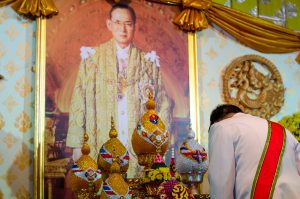On Monday, the Bangkok Criminal Court in Thailand’s capital sent three prominent democracy activists to pretrial detention on charges of insulting the monarchy, consigning them to potentially years in prison before their cases come to trial.
According to the rights group Human Rights Watch (HRW), Thailand’s attorney general charged Panusaya “Rung” Sithijirawattanakul, Jatupat “Pai” Boonpattararaksa, and Panupong “Mike” Jadnok with lese majeste for making speeches demanding reforms of the monarchy during a political rally on September 19.
If found guilty of lese majeste under Article 112 of the Thai Criminal Code, the activists could face up to 15 years in prison. The trio was also charged with sedition under Article 116, which carries a maximum seven-year sentence.
The decision, just the latest use of the controversial lese majeste law to quell a rising wave of dissent, effectively prevents the activists from taking part in the ongoing youth-dominated protest movement, which gained momentum in the second half of last year. The demonstrations have centered around calls for the resignation of Prime Minister Prayut Chan-o-cha, the drafting of a new a genuinely democratic constitution, and – most explosively – reforms to curb the nearly unassailable power of the Thai monarchy.
After initially holding off from filing charges under Article 112, reportedly at King Vajiralongkorn’s request, the Thai authorities have now given in to temptation and charged at least 58 people with lese majeste in connection with the protests. It has also revived some dormant cases of royal defamation, including one in which a former civil servant was sentenced to 43-and-a-half years in prison in January
Monday’s charges follow the court’s February 9 decision to send four prominent democracy activists to pretrial detention on similar charges. Over the past month, the court has denied their requests for bail five times, according to HRW, saying the group is likely to “reoffend” if released.
The Thai protest movement has entered a period of hiatus since its peak in October and November, largely due to a spike in COVID-19 infections in Thailand at the start of this year, but has been revived by the jailing of protest leaders.
On March 6, several thousand demonstrators gathered in the Thai capital, including in front of the Bangkok Criminal Court, demanding that authorities release jailed protest leaders, and defying an order banning public gatherings in the city. Protesters held signs reading “Abolish 112,” while others set photos of King Vajiralongkorn on fire.
The court rulings indicate that Prayut’s government is pushing ahead with its own attempt to quell the protests and challenge that they pose to the wealth, status, and prerogatives of Thailand’s military-royalist elite. In so doing, they are likely to benefit from the political crisis currently unfolding in Myanmar.
While the protests in Thailand dominated Southeast Asia’s news agenda in the second half of 2020, global attention is magnetized by the upheavals in Myanmar, which has seen a nationwide protest since the military’s seizure of power on February 1.
During that time, pro-democracy movements in the two nations have cross-fertilized via the internet, sharing symbols and tactics. Thai activists have shown solidarity with their Myanmar counterparts, and have held protests outside the Myanmar Embassy in Bangkok alongside the city’s large population of Burmese migrant workers.
Unsurprisingly, the Thai Immigration Department yesterday issued a statement warning that the authorities will “immediately revoke without consideration the visa” of any foreign citizens involved in protests “for any purpose.” So far, Thailand has been the Southeast Asian nation that has been most openly tolerant of the new military junta in Myanmar, perhaps wary about the contagion effect: of protests for democracy in Myanmar rolling into more potent calls for reform in Thailand.
This development suggests that the two governments, one an open military dictatorship, the other simply a veiled one, will stick together in the uncertain months to come.

































